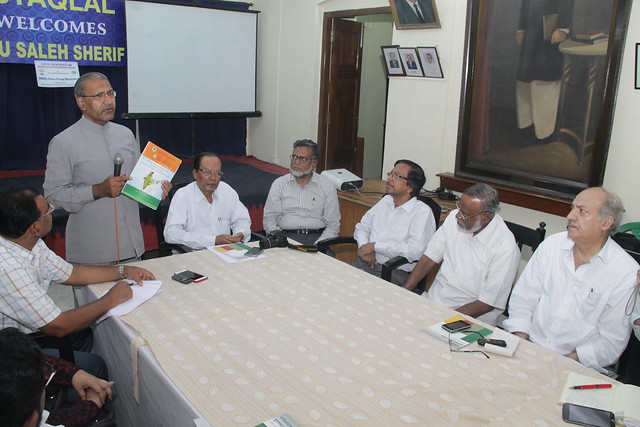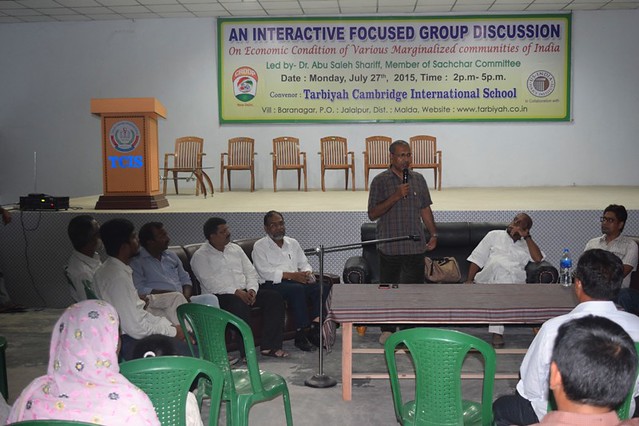By Zaidul Haque, TwoCircles.net,
Kolkata: With a view of preparing a comprehensive post-Sachar Committee assessment of the minorities in the country, the member-secretary of the Sachar Committee and noted economist Dr Abu Saleh Shariff is gathering data on their social and economic status.

Dr Abu Saleh Shariff discussing on `Economic condition of various Marginalised communities of India’ at Iran Society Hall in Kolkata on 26 July, 2015.
Dr Shariff is this time working on an independent report and has hence sought help from social organisations in gathering the data. He feels that in the current situation, government officers may not be able provide with the accurate data and hence in every state, with the assistance of at least two former government officers, he is preparing a database of each district.
To begin with, Dr Shariff is focusing on 10 states, with sizable Muslim population and hopes to being a comprehensive report on 10 states by 2018. He said that once he finishes with the 10 states, he will proceed to complete the survey in other states.
Shariff elaborated on his plan during his recent tour of West Bengal, where he went to participate in group discussions on `Economic condition of various Marginalised communities of India’ organised in Kolkata and Malda town. In Kolkata it was held on 26 July at the Iran Society Hall and was organised by Urdu Magazine `Istaqlal’. In Malda, an interactive focused group discussion took place at Tarbiyah Cambridge International School on 27 July.

Dr Abu Saleh Shariff participating in a Group Discussion on `Economic condition of various Marginalised communities of India’ in Malda Town, West Bengal on 27 July, 2015
The 2007 report might have been named after retired judge Rajinder Sachar, but it was economist Dr Abu Saleh Shariff who collated the data and actually wrote the report. He said that his latest survey, however, will be very different from the Sachar Report which was based only on government data. He said that to make his survey more comprehensive, this time he will also include the data sourced from different non-governmental social organisations.
He informed that his will try to collect district wise data as much as possible that will comprise of other minority communities as well besides Muslims. He said that with the help of local organisations he will try to incorporate data from slums and rural areas on things like the number of children actually going to school, and other socio-economic parameters that are rarely represented in any government data.
He said that he visited many slums and village where if there are 10 thousand children of school going age, but hardly a thousand is actually going to schools. He said that he will try to prepare a comprehensive analysis of reasons as to why they are not able to go to schools, for which he feels, it would be imperative to not only visit rural areas, but also collaborate with a number of local grass root organisations.
Besides, education and health, the survey will also focus on issues like transpiration, electricity supply, drinking water, etc. and will enquire into the number of people who hold bank accounts to compare a Muslim locality with other areas for assessment of current development and to see the effectiveness of the multi-sectoral development programmes (MSDP).

